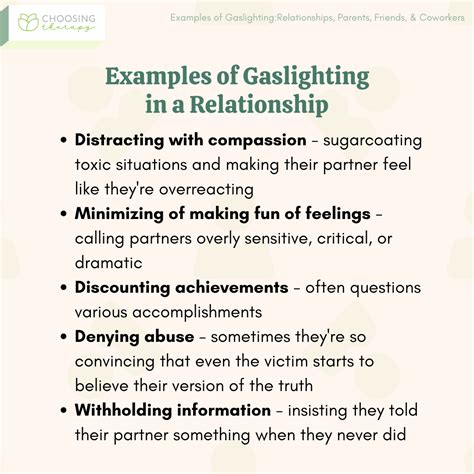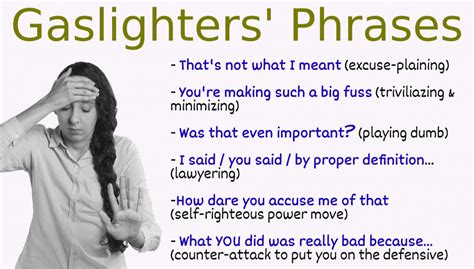The term "gaslighting" has a fascinating and somewhat disturbing origin, rooted in a 1938 play and later a 1944 film, both titled "Gaslight." The story revolves around a husband who attempts to drive his wife insane by manipulating her perception of reality, making her question her own sanity. This manipulation is achieved through a series of subtle and insidious actions, including the dimming of gas-powered lamps, which the husband denies doing, leading the wife to doubt her own memory and perceptions.
Historical Context and Evolution of the Term

The concept of gaslighting, however, predates the play and film. In the late 19th and early 20th centuries, there were reports of similar psychological manipulations, although they were not referred to by this term. The play and film “Gaslight” popularized the concept, making it a recognizable phenomenon in the public consciousness. Over time, the term has evolved to encompass a broader range of behaviors beyond the original context, including emotional manipulation, denial of previous agreements or conversations, and projection of one’s own behaviors onto the victim.
Psychological Perspective on Gaslighting
From a psychological standpoint, gaslighting is a form of psychological manipulation where a person seeks to sow seeds of doubt in a targeted individual or group, making them question their own perception, memory, or sanity. This can be achieved through various tactics, including denial, blame-shifting, and minimization of abusive behavior. The effects of gaslighting can be profound, leading to anxiety, depression, and in severe cases, a complete breakdown of a person’s sense of identity and reality.
| Psychological Effects | Description |
|---|---|
| Anxiety and Stress | Continuous doubt and fear can lead to heightened states of anxiety and stress. |
| Depression | The erosion of self-confidence and the feeling of being trapped can contribute to depressive states. |
| Identity Distortion | Repeated manipulation can lead to a distorted sense of self, making it difficult for the victim to discern reality from fiction. |

Sociological Implications and Modern Applications

Gaslighting is not limited to interpersonal relationships; it can also occur on a societal level, where institutions or governments manipulate information to control public perception and opinion. The advent of social media has further complicated the issue, as it provides a platform for widespread dissemination of misinformation and manipulation. Recognizing gaslighting tactics, whether in personal relationships or in the public sphere, is crucial for maintaining a clear understanding of reality and promoting truth and accountability.
Strategies for Recognition and Resistance
To recognize and resist gaslighting, individuals must be vigilant and critically evaluate the information presented to them. This includes seeking out multiple sources of information, maintaining a strong support network, and trusting one’s own perceptions and instincts. Furthermore, promoting a culture of transparency, honesty, and respect can help to mitigate the effects of gaslighting and foster healthier relationships and societal dynamics.
Key Points
- The term "gaslighting" originates from the 1938 play and 1944 film "Gaslight," which depicted a form of psychological manipulation.
- Gaslighting involves making a person doubt their sanity, memory, or perception through manipulative behaviors.
- The effects of gaslighting can include anxiety, depression, and a distorted sense of identity.
- Recognition and resistance strategies include critical evaluation of information, seeking multiple sources, and maintaining a strong support network.
- Gaslighting can occur on both an interpersonal and societal level, emphasizing the need for awareness and education to prevent and address such behaviors.
In conclusion, the term "gaslighting" encapsulates a complex and multifaceted issue of psychological manipulation, with roots in early 20th-century drama and evolving to encompass a wide range of behaviors and contexts. Understanding gaslighting, its effects, and how to recognize and resist it is essential for promoting healthy relationships, fostering a truthful and accountable society, and protecting individual well-being.
What are the primary psychological effects of gaslighting?
+The primary psychological effects of gaslighting include anxiety, depression, and a distorted sense of identity. These effects can vary in severity and impact, depending on the duration and intensity of the manipulation.
How can individuals recognize and resist gaslighting behaviors?
+Individuals can recognize and resist gaslighting by critically evaluating information, seeking out multiple sources, maintaining a strong support network, and trusting their own perceptions and instincts. Promoting a culture of transparency, honesty, and respect is also crucial.
Can gaslighting occur on a societal level?
+Yes, gaslighting can occur on a societal level, where institutions or governments manipulate information to control public perception and opinion. This can be particularly problematic in the age of social media, where misinformation can spread rapidly.



